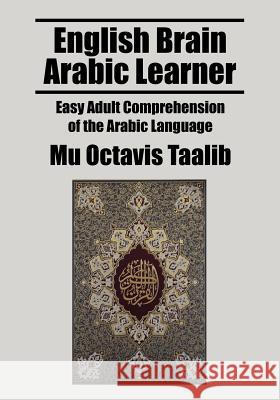English Brain Arabic Learner: Easy Adult Comprehension of the Arabic Language » książka
English Brain Arabic Learner: Easy Adult Comprehension of the Arabic Language
ISBN-13: 9781432780975 / Angielski / Miękka / 2011 / 88 str.
Learning the Basics Using the Simplest Approach Possible Never has explaining the underpinnings of Arabic been so explicit, so clear. Written for a wide audience, with this book English speakers will actually enjoy learning to understand the Arabic language. The author gives readers the basic tools they need to comprehend Arabic in a simple, concise way. Virtually anyone can read the book. Written in first person plural, instructional material like this, that reads as easily as a narrative, is hard to come by these days. Mu Octavis Taalib instructs Arabic courses in suburban Atlanta. As an apprentice, he studied the Arabic language as taught by Nashid Abdul Khaaliq, an Arabic and Qur'aanic scholar from Boston. Then Abdul Khaaliq was fresh back from two years in Cairo, Egypt, and it's Al Azhar University. Taalib explains, "The months I spent seated in front of Abdul Khaaliq were remarkable times. He was such a extraordinary teacher, an educator in the truest sense of the word. He brought the Arabic to life and put it within reach." As a Foreign Service Officer and diplomat, Taalib spent the latter part of his career at the U.S. Embassy in Cairo. He made time to decipher the language as he traveled throughout Egypt and the region, Jordan, Israel, Yemen, Morocco, Kenya, Uganda, and Nigeria. After returning to the U.S. in 2008, he decided to enhance his cultural experiences by training as a Global TESOL instructor. He studied under the renown Global TESOL professor, Dr. Sarah A. Shope. "I applied my learning from the TESOL graduate course, a Hampton University background, experiences in the Arabic-speaking world, and studies in culture and Arabic. I synthesized these elements with adult learning methodologies. The result has been a format that has proven to really work well for adult learners 'on the fence' and those who are near to abandoning Arabic study altogether." Brain-Centered Approach In his book, English Brain Arabic Learner, Taalib uses a brain-centered approach for teaching adults basic comprehension of Arabic. "Many would-be Arabic learners fail to learn the basics of the language because of simple points. Many instructors push learners too hard sometimes just to memorize the letters without giving them proper explanation of what the letter basics are or even why they are formed. They ignore the perceived mystery associated with Arabic and they don't address the myth about it being such a complicated language to learn. Having spoken, read, written, and listened to English all of our lives, naturally our conscious minds would be wary to intake any new and unfamiliar language, not just Arabic. We use approaches adult brains can accept easily as opposed to using force to make it do something against its will."











